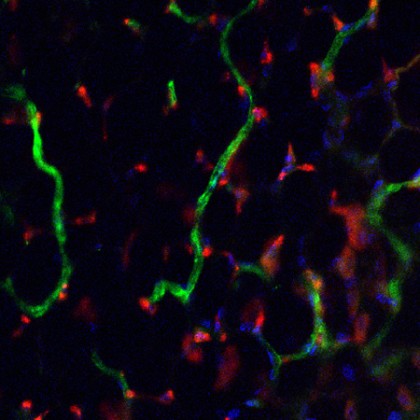Johns Hopkins researchers have coaxed stem cells into forming networks of new blood vessels in the laboratory, then successfully transplanted them into mice, a technique that could potentially be used to make blood vessels genetically matched to individual patients, the investigators say.

Image caption: Lab-grown human blood vessel networks (red) incorporating into and around mouse networks (green).
Image credit: PNAS
Their research results appear online this week in the Proceedings of the National Academy of Sciences.
The stem cells are made by reprogramming ordinary cells, and because they are genetically matched, they are unlikely to be rejected by patients' immune systems, researchers say, though other barriers remain to efficiently producing the blood vessels and using them for treatment.
"In demonstrating the ability to rebuild a microvascular bed in a clinically relevant manner, we have made an important step toward the construction of blood vessels for therapeutic use," says Sharon Gerecht, an associate professor in the Johns Hopkins University Department of Chemical and Biomolecular Engineering, Physical Sciences–Oncology Center and Institute for NanoBioTechnology. "Our findings could yield more effective treatments for patients afflicted with burns, diabetic complications, and other conditions in which vasculature function is compromised."
Read more from Hopkins MedicinePosted in Health, Science+Technology
Tagged biomedical engineering, stem cells, biomolecular engineering







